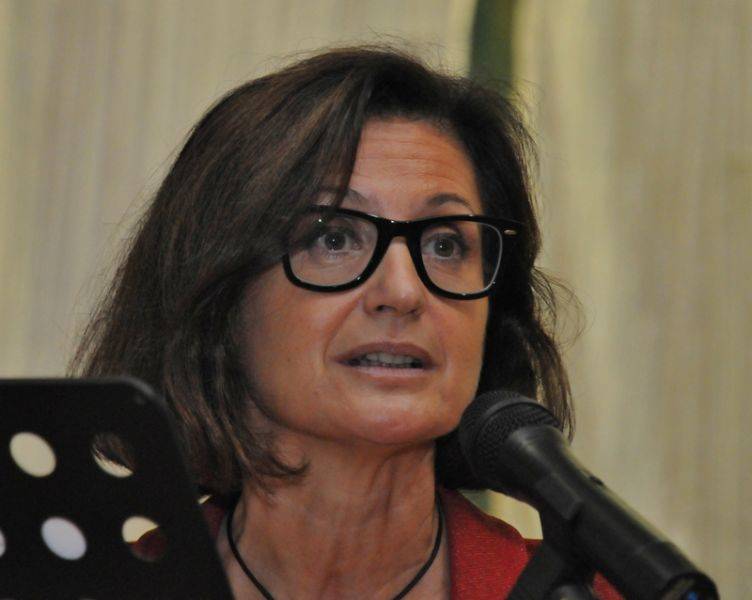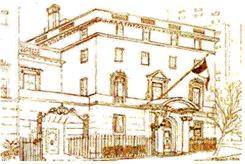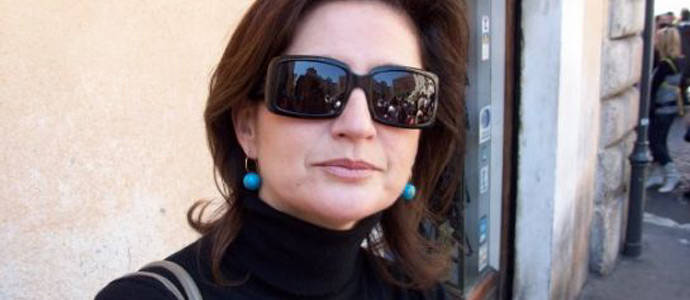Conversing with Natalia Quintavalle
We meet over coffee and tasty biscuits, in a relaxed atmosphere that allows us to get to know her better. She tells us about herself effectively. She immediately closes the gap that many criticize the representatives of our institutions for creating. But she does so without compromising her authority or poise.
Natalia Quintavalle, the new Consul General of Italy, has already lived in New York and is very familiar with the city. Like many, she was not immune to its allure.
“After having lived here, I came back frequently for business. And I always had the feeling of coming home. I came for the General Assembly in September and in December for the end of the fifth commission. The feeling was always one of returning to a familiar environment. Of returning home, in fact.”
And so our meeting begins with those words. More than an interview, it will become a free exchange of thoughts and ideas. Quintavalle was born in a region of Italy that Americans are very fond of, Tuscany, specifically in Pietrasanta. Her husband is a diplomat who works in Rome and so she brought her daughter with her to New York. As she speaks, her words are full of enthusiasm, but the expression on her face is enough to understand how important this position is to her.
“The idea of returning to New York, to spend another four years in a role that is so different, but at the same time one that allows me to immerse myself in the life of this city, gives me great joy and satisfaction. It was a decision I made quickly, for various reasons, so I had to address several professional and personal issues promptly. Putting all the pieces in place...it feels great.”
It’s been a little over a month since your arrival. The consular district assigned to you is complex and vast. From your words we gather a tremendous amount of interest as well as patience and a desire to understand and learn one step at a time, beginning with the most basic consular services.
“I am still in the process of understanding the many facets of my position. There is a part that let’s say is the “structural” work of the consulate, providing services to the community. That’s very important. There is a structure in place that works well; it’s set up in a way that effectively addresses the needs of Italian nationals. We have excellent staff members in all areas. As for the diplomats, my two colleagues Laura Aghilarre and Lucia Pasqualini have been here for a while and have their fingers on the pulse; my other colleague, Sorrentino, came with me, but he already had significant consular experience.”
Your professional experience has allowed you to hone many important and diverse skills such as development and cooperation at the UN in addition to those that are more specific to your consular responsibilities such as political affairs, commercial interests, and human rights. It would seem that somehow New York represents a balance, the natural corollary to all of your experience in various sectors.
“I hope to bring all of this to my work here. I won’t have to start from scratch. Much of the experience I have will certainly help me. But there will be new challenges. We must present the most current, realistic image of our country in the best possible way – fighting stereotypes while promoting what is good, and doing so through modern tools that did not exist a few years ago and making the most of them.”
Your arrival coincides with a very difficult economic situation as well as important changes within the ICE (Italian Trade Commission) network. We’d like to take this opportunity to discuss these changes. Consulates along with embassies will play a more prominent role in promoting Italian commercial interests.
“The overseas offices of ICE (Italian Trade Commission), particularly those in New York, are the backbone of Sistema Italia. They have done and continue to do an extraordinary job of promoting the interests of Italian companies, especially small and medium businesses. And at this time, of course, smaller companies are facing the greatest difficulties in foreign markets.
Very simply, it’s about putting together what ICE does, what the former ICE has always done, with what we do at the Italian Consulate, the Italian Cultural Institute, and other Italian institutions (ENIT, the Chamber of Commerce, etc.) to support and promote the image of Italy.
The mission for any organization that has benchmarks, whether focused domestically within Italy or involved in the foreign network, is not easy. In Rome there is an ongoing period of adjustment, and we are affected by decisions that are made in Italy. But we’re already working together, sharing our experiences; it will be a year of transition.
Among other things, the ICE has a tendency toward innovation and using technology that is superior to ours. We have a bureaucratic system that is slightly more cumbersome. In some ways it’s necessary, so I don’t mean to say that it’s a defect. But I am convinced that this collaboration will create the impetus for us to work in a more modern way.”
The task at hand is demanding for several reasons. There are definitely various aspects that point to increased coordination within Sistema Italia.
“Undoubtedly there is much work to be done, and coordinating and enhancing all that Italian institutions offer is a big part of it. But other American and international institutions that focus on Italy will also take part in our joint efforts.”
In this context, how important are universities?
“Very important. And there are several important ones here in New York. Just think of NYU with Casa Italiana Zerilli-Marimò, Columbia University with the Italian Academy, and CUNY with the Calandra Institute. But apart from these that are strongly characterized as Italian and Italian-American, there are various departments within universities in New York that have a particular focus on our country – its art, culture, and even its economic and commercial interests. We must make the effort to work with those who already have a vocation to focus on Italy as well as those who would like to but cannot find the right channels to do so.
I think we need to proceed decisively in this direction, together with the Italian Cultural Institute with which we have an excellent relationship. We must take advantage of the proximity between us to launch joint initiatives.
Then there’s also La Scuola d’Italia Guglielmo Marconi. It’s important to note that what they offer is interesting and innovative, not only for Italians but also for Americans. I've already spoken with Anna Fiore, the head of the school. It’s a perfectly bilingual curriculum that is available to all, not only to the children of Italians who live here.”
You’ve also reflected on the complexity of the Italian community in New York. It’s an assessment that I’d like you to share since it’s similar to i-Italy’s experience….
“The very first few days I was here, in my mind there was a bit of a division: the Italian-Americans of an older generation; younger, third and fourth generation Italian-Americans; and those Italians who are arriving today…. But I realized that actually the children of Italian-Americans and their peers who come from Italy are actually very similar.”
I’ve come to see through my own experience and education that the Italians who come to America today and the grandchildren of Italian immigrants to the U.S. have a similar cultural background….
“Yes. They don’t necessarily have the same priorities but certainly they are similar. I think we are moving towards more inter-connectedness among Italians, Italian-Americans, and Americans. And the work of i-Italy moves in that direction, too. In a sense, it anticipated it. Technology also helps in this. Young people are all on the web, Facebook, Twitter. They talk, discuss, compare. They overcome barriers. We’re on the right track.
The biggest effort we must make is not to allow Italian culture to become irrelevant in this great melting pot. It’s also important to promote our language. We should all be able to speak English and communicate in English, as well as to say that we have another asset: Italian.
It’s just as important to know how to speak and communicate in Italian. Fortunately there is a very strong interest for many Americans who go to Italy and study Italian to retain the language when they return. There is a great deal of focus at the embassy in Washington; Ambassador Terzi has made this initiative a major part of his work and we all support it. Of course, we are conscious of the fact that, especially in New York, there is strong competition with the Spanish language. Offering courses in Italian might seem excessive, but there is a demand for them and it must be met. The measure of success obviously will be the result of the demand and we must ensure that the demand continues to exist and grow.”
You are aware of the “upstream” difficulties inherent to teaching Italian….
IACE (Italian American Committee on Education) has given a big boost to the teaching of Italian in American schools. The recovery of the AP exam in Italian is essential – but training those who teach the language is also essential. We diplomats are well aware of it, we are required to learn many languages and we realize that it is not so easy. Knowing the Italian language well does not mean knowing how to teach it. Whoever is going to teach it, especially within the rich context of a foreign language and culture, must have a background in teacher education, not only a good knowledge of the material.
Let’s talk about the Comites. They are very important. But it’s also necessary for them to work with young people and recently arrived Italians who very often don’t even know about these organizations.
“I’ve already met them on different occasions although I have not had direct, official contact. The Comites have played a key role in the past. I’ve followed their path over the years and they are very useful tools. We must now see how they adapt to the changing profile of the community they represent.”
Again, as with many other traditional Italian-American associations, we have the problem of the near-absence of young people….
“It’s about overcoming the idea that still persists that they represent Italians of an older generation, but I am convinced that the Comites are fully aware of the need for change.”
Let’s turn to a more controversial topic in the Italian-American community. It involves their representation in the media, specifically about the controversy surrounding the notorious program The Sopranos and in recent months, the reality show Jersey Shore.
“We must distinguish between a few issues. I am convinced that we are in a free country and therefore everyone has the right to support whatever he or she wants. The Sopranos is a well-made television show from a cinematic point of view which puts forth an image that can offend many sensibilities in this country. When it was released in Italy it did not provoke the same reactions; in fact it was acclaimed early on.”
It’s true. A few said that Chase’s program demystified the mafia. He inserted Tony Soprano into a daily life that was not exciting. Tony Soprano does not have the charm of the Godfather; he’s rather fragile, sometimes even ridiculous, and always human. He’s the quintessential anti-hero.
“Indeed. But as far as Jersey Show is concerned…it’s just unwatchable. Not only because it presents a distorted image of italianità but because it’s so much like so many other reality shows we see in Italy. It’s rubbish. Trash!
I don’t know how interesting it is as a television program, but it is a mirror, perhaps a distorted one. It’s a social phenomenon depicting marginalized youth, and therefore it must be discussed.
I have also recently heard about an episode of Law & Order based on the Strauss-Kahn case, but the protagonist was cast as an Italian. Why was this decision made? That’s a question for the writers. I don’t want to read things like: ‘We don’t want to offend the French; we can offend Italians instead without any problems…’ Of course I’m perplexed. There seems to be an image of the consul of Italy with an arrogant air, as if to say, ‘You don’t know who I am.’
In short, I sincerely hope that my presence can dispel this type of image.”
The conversation continues in a pleasant manner with little formality.
Having a woman in charge of a consulate in 2011 should no longer be news. Most of the articles written about you, though, center on the idea that this prestigious institution is now headed by a woman who has two other important leaders “in pink” by her side….
“It’s true; this should no longer be news. But in Italy there are very few women who have a career in diplomacy. Especially at higher levels, there is still a significant gap. With our association of women in diplomacy, we are trying to address this. Progress has been made but for many it still sounds a little strange to have a woman in this position….
Actually for me it was a pleasant surprise to get here, to find two female colleagues in diplomacy and an administrative staff with a larger percentage of women. I am convinced, having seen it over the years, that women have a better capacity to collaborate and a tenacity that is often higher than that of male colleagues. And they work well with male colleagues. The consulate also needs to pay special attention to the psychological profile of its constituents and I think we can become examples on how to do this.
We’ve certainly received a lot of attention from the Ministry; there are people who judge this development positively and Minister Frattini is among them. For him, it’s important to have women in leadership positions abroad.
I also suspect that within the Ministry there are some people who think, ‘Now let’s see how they’re doing, let’s put them to the test and if they don’t succeed we know we can’t push them in that direction….’”
From the consul general to the mother of a 15 year old daughter...
“My daughter is glad to be back in New York; she had already been here. For now, this means a period of separation from her father who is in Rome, but we hope that he will join us soon. It will be good for everyone.
This conversation is not easy with a fifteen year old who has endured continual uprooting. I will be very busy and she will often be alone. I will try to convince her to come with me from time to time. However her studies are her top priority. She definitely has a strong interest in Italian affairs, literature in particular….”
We leave her in her office, inside the historic townhouse on Park Avenue. We are struck by the sweet expression on her face as she speaks of her daughter and her steadfastness at a time of great responsibility and dedication to serving the community.




































i-Italy
Facebook
Google+
This work may not be reproduced, in whole or in part, without prior written permission.
Questo lavoro non può essere riprodotto, in tutto o in parte, senza permesso scritto.